‘Done in a flash’: Malaysians laud quick border checkpoint clearance with new app but want glitches fixed
The MyBorderPass app - which facilitates both QR code and facial recognition immigration clearance at the borders - is currently only for Malaysians but there are plans to expand usage to foreigners by the middle of this year.
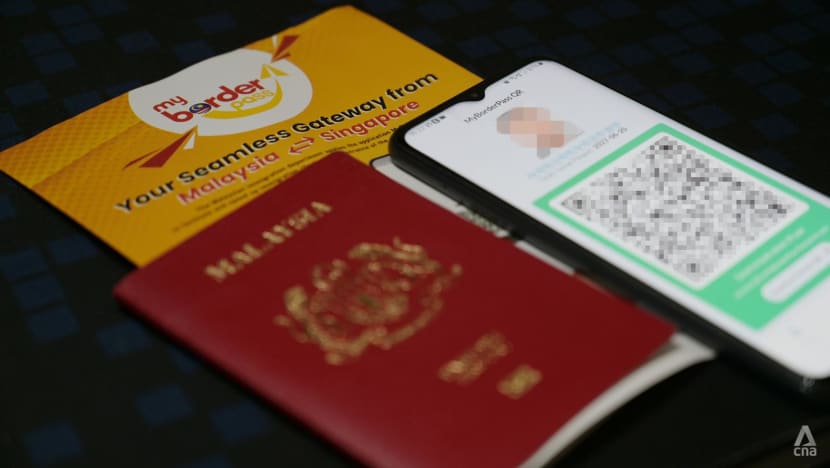
Malaysian travellers can now experience a seamless crossing of the border by using the MyBorderPass QR code at the Bangunan Sultan Iskandar checkpoint. (Photo: CNA/Zamzahuri Abas)

This audio is generated by an AI tool.
JOHOR BAHRU: When travelling back to his home in Malaysia across the Causeway during the recent Chinese New Year holidays, Malaysian Ravinder Singh had to endure a three-hour journey cumulatively to cross the motorway by bus and clear immigration on both sides.
The 45-year-old - who works in Singapore as a product head of an IT company - had to tussle with hundreds of thousands other travellers commuting from Singapore to Johor Bahru during the festive season.
While some travellers may baulk at the time he took to make his way across the border, Singh was conversely relieved.
“During last year's CNY, I took eight hours to make the same journey. The journey is significantly shorter this time and I’m thankful,” he said.
Singh noted that beyond the recent trip during Chinese New Year, his travel time across the Causeway of late has been on average much shorter.
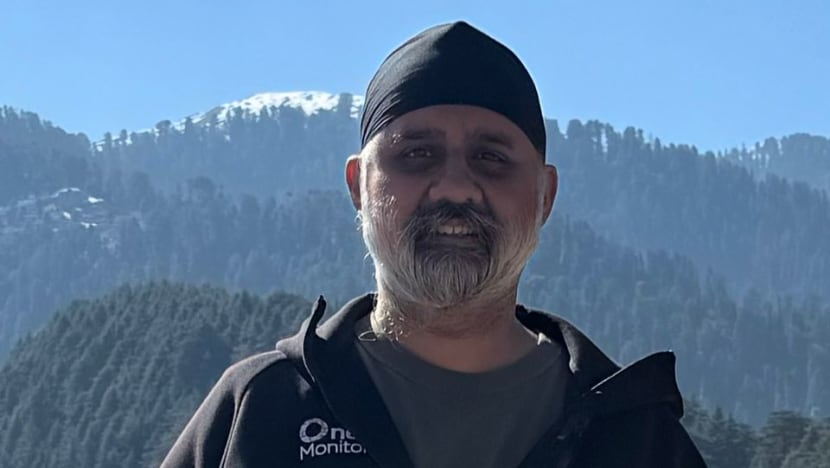
He typically travels across the Causeway twice a week, and Singh estimates that the journey time for each trip has been reduced by around 30 minutes to an hour.
He attributes this partly to the launch of the MyBorderPass application by the Malaysia government which enables travellers to clear immigration via QR code or facial recognition without the need to use their passports.
For now, usage of the app is reserved only for Malaysian citizens at some border crossings, including at the land checkpoints with Singapore.
“Travelling is a breeze. You don’t need to even take out your passport. (You) just need to use your phone to scan the QR code and you can go. It takes less than 15 seconds,” said Singh.
“Travelling across the Causeway can be a real hassle and the passport-free initiative saves a lot of time, especially since more people are using it and the queues move along faster.”
Other frequent travellers whom CNA spoke to have also lauded the MyBorderPass app as it makes the process of clearing immigration faster and hassle-free.
However, some users have reported experiencing glitches when using the app while others have expressed concerns over data security.
Experts have also urged that the app be refined and eventually expanded to the larger population and foreigners, as it is crucial that Malaysia facilitates smooth travel at its borders.
APP BOOSTS CONVENIENCE BUT HAS ROOM TO IMPROVE: USERS
Malaysians who have used the app told CNA that they are mostly satisfied with how it has improved their travel experience but many acknowledged that there is room to refine it.
Johorean Vikneswaran Chellannu, who uses the app 10 times a week when he commutes by motorcycle across the land checkpoints, told CNA that it takes him as fast as three seconds to clear immigration as the MyBorderPass app enables bikers to use just facial recognition without the need to pull out their phones.
The app requires users to register for facial biometric recognition during the registration process.
“Previously, before MyBorderPass or any other app, it took me three minutes to clear immigration at BSI. But now it’s done in a flash,” said Chellannu, referring to the Bangunan Sultan Iskandar (BSI) customs, immigration and quarantine complex at the Johor-Singapore Causeway.
“For us bikers clearing immigration can be challenging because we have to balance the bike and search around for our passports, and sometimes it's raining heavily. This way is much better,” added the 34-year-old who works in IT.
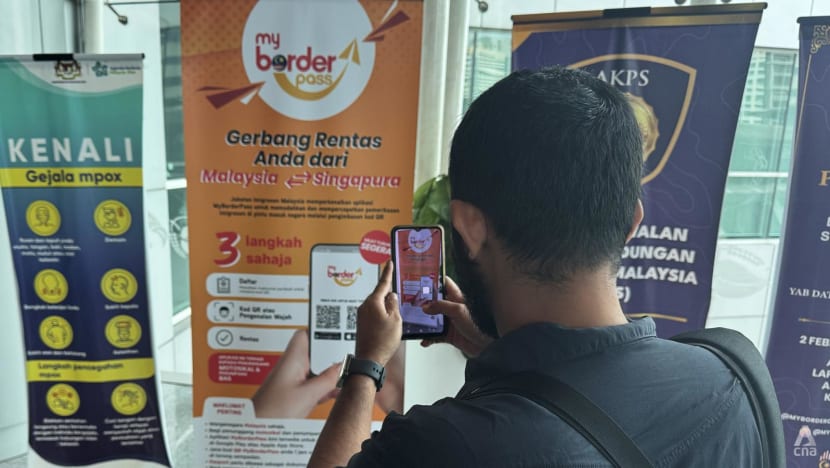
IT analyst Sarguneshwara Subramaniam, who travels across the Causeway three times a week by motorcycle, echoed similar sentiments.
“When I travel during off-peak hours these days, commuting across the Causeway can be done in as fast as 15 minutes, thanks to this passport-less system on both sides of the border,” said Subramaniam.
Passport-free travel has been on the cards for Malaysia over the last year.
Malaysian authorities launched a pilot trial between June and November 2024 for Malaysian citizens travelling across the land checkpoints in Johor by bus and motorcycles to use QR code clearance.
During the trial, authorities also used three separate apps - bus travellers at the Sultan Abu Bakar Complex customs (KSAB) linked to the Tuas Second Link used the MyTrip app, while those at BSI used the MyRentas app. Motorcyclists at BSI used the MyBorderPass app.
However in December 2024, local media reported that MyBorderPass was chosen as the sole app to be used for travellers.
A senior official of the Johor state government also told CNA that passport-less immigration clearance could be expanded to Singaporeans and other foreign passport holders by the middle of 2025.
The app is currently available for use by Malaysians at the land checkpoints at BSI and KSAB in southern Johor as well as at the airports KLIA and KLIA 2 near Malaysia’s capital Kuala Lumpur.
Home Affairs Minister Saifuddin Nasution Ismail said in January that more than half a million Malaysians have downloaded the app and that Malaysia’s biggest airport KLIA has 40 autogates equipped with the QR code system.
On the Singapore side, the Immigration and Checkpoints Authority (ICA) said that all travellers arriving and departing via Singapore land checkpoints by car, motorcycle, lorry or bus can present the QR codes generated via the MyICA mobile app in lieu of passports.
The exceptions are first-time foreign visitors entering Singapore and those re-entering the country using a different passport from their last visit.
However, Subramaniam pointed out that unlike the MyBorderPass, the MyICA app allows users to generate a single QR code for multiple travellers.
He said that this allows for more efficient clearance for cars with multiple passengers or motorcyclists with pillions.
“I think this is something MyBorderPass should implement quickly, because it allows the queues to move much faster if many travellers can clear (immigration) on a single QR code,” he added.
Singh - the IT product head - told CNA that he has also experienced glitches with the app.
He said that for five times over the last two months, he would inexplicably be unable to load the QR code when he reaches the immigration counter for clearance and would be forced to restart the app, input his pin number and refresh for a new QR code.
“This causes a delay for around a minute or two and can be quite cumbersome since it can hold up the queue,” said Singh.
“I hope this can be resolved - it could be a problem with internet connectivity or the mobile application (itself).”
When CNA made a two-way trip across the Causeway via bus on Tuesday (Feb 4) to test out the MyBorderPass app, it worked seamlessly at the BSI counters leaving Johor Bahru. But a glitch happened when re-entering Malaysia as the QR code generated could not be detected by the scanner, causing a one-minute delay.
A new, functioning QR code was produced only after the app was restarted. An immigration officer at the counter told CNA that this “issue happens frequently”.
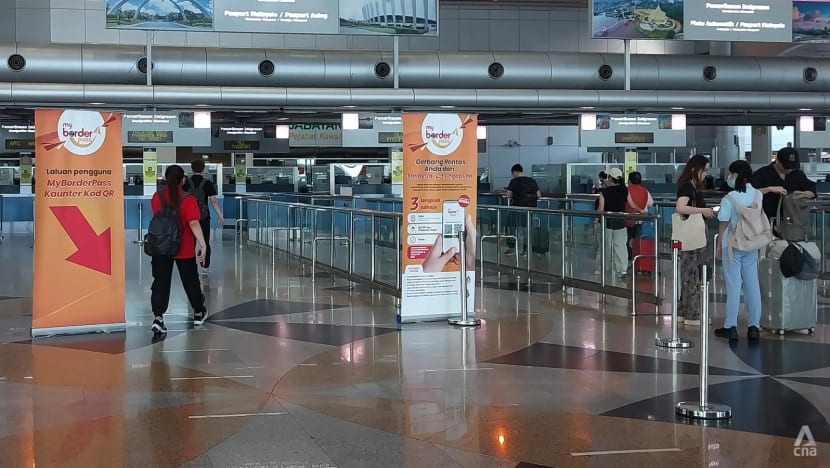
Real estate consultant and urban planning analyst Tan Wee Tiam, who is executive director with Johor boutique firm Olive Tree, told CNA that such glitches should be fixed as soon as possible as it could exacerbate congestion rather than alleviate it.
"Such glitches do not happen very often, (but) it is still important to fix them as any restart or lagging issue will lead to long queues during peak periods,” said Tan.
He added that the Malaysian authorities should also add the function of allowing for a single QR code for multiple travellers, as this will pave the way for the app to be used by commuters travelling by car in groups.
“This is one way to also reduce bottlenecks as QR code is especially efficient when it clears four-five people at one go,” said Tan.
SYNCING APP WITH MYDIGITAL ID WOULD REDUCE DATA SECURITY CONCERNS: USERS
Some travellers have also raised concerns with data security when using the app.
MyBorderPass requires users to update their details manually or by scanning their passports, but these travellers are concerned that the app may not employ robust encryption to protect personal information.
Benjamin Ho, a waiter who commutes by bus across the Causeway daily for work in Singapore, told CNA that he does not use MyBorderPass because he is afraid that his personal details may be leaked.
He cited instances of data leaks that have allegedly occurred involving Malaysia’s national identity card system MyKad as reported by local media, though this has been denied by the national registration department.
In October 2024, Malaysia’s Minister of Digital Gobind Singh Deo said that data breaches cases in the country have surged by 1,192 per cent between 2022 and 2023. He also warned that data leaks have serious implications on national security.
"Sensitive information like personal details of citizens, government secrets, and security data can be manipulated by threat actors and hackers,” he reportedly said.
Ho said that while he has not used MyBorderPass to clear immigration on the Malaysia side, he uses the MyICA app to clear on the Singapore side as the app is synced with Singapore’s digital identity and personal authentication system Singpass.
“I think it’s just safer to wait and see how the MyBorderPass system turns out. I don’t know how to explain it, but I’m (uneasy) with the (personal data protection) issues,” said the 42-year-old.
“Maybe when it syncs up with MyDigital ID, things will be better,” added Ho, referring to Malaysia’s digital identity platform which has similar functions to Singpass.
Security supervisor R Rajeev, who commutes via motorcycle five times a week between Johor and Singapore told CNA that he also has concerns on personal data protection when using the MyBorderPass app.
“I still use it because it allows me to clear so quickly, but I am a bit worried if my data gets leaked. If someone hacks and uses my account to clear immigration that can be quite bad,” said the 38-year-old.
“I think if it's synced with MyDigital ID it will be safer,” added Rajeev.
Last month, Malaysia’s immigration department deputy chief Amirul Ariffin Lakimin was quoted by Malay Mail as saying that the MyBorderPass application is secure as it is protected by “appropriate measures” that is safeguarded under Malaysia’s Personal Data Protection Act 2010.
“The data is used solely for immigration purposes and does not involve third parties, ensuring protection against data theft,” he reportedly said.
Academic Ong Kian Ming - who is pro vice-chancellor of external engagement at Taylor's University in Selangor - told CNA that when he initially downloaded the MyBorderPass app, there was a text at the bottom of the app indicating that it will be integrated with MyDigital ID.
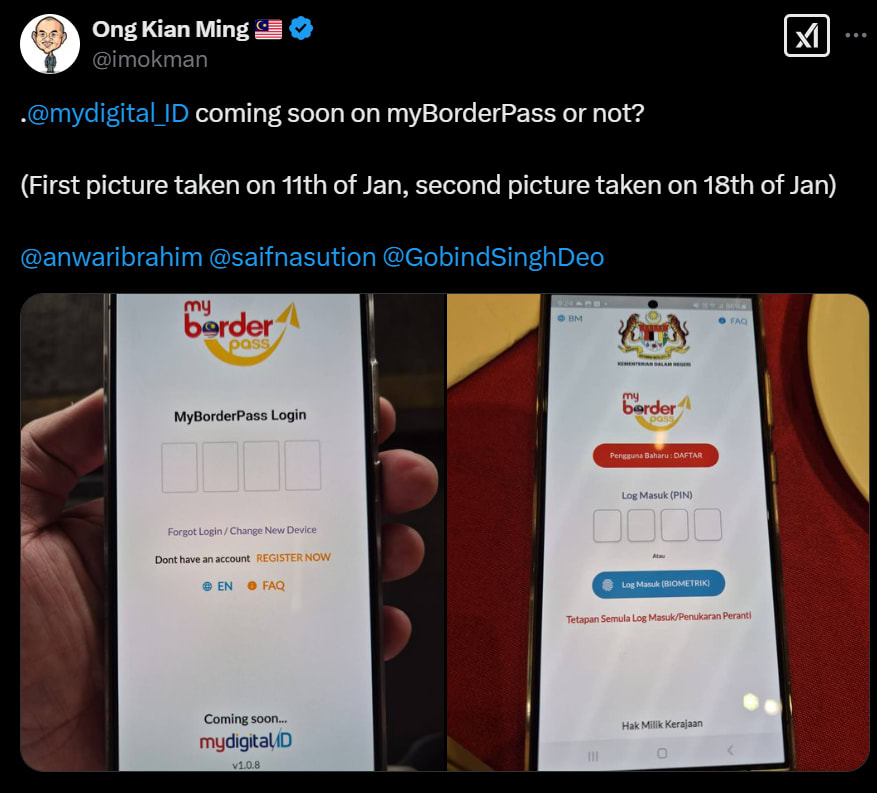
However, when he checked a week later, the statement disappeared and has not reappeared since.
“I'm not sure as to the reason for the disappearance of this statement, but I'm still hopefully that this app (and other government apps) can be synchronised via the back end with the MyDigitial ID as a Single Sign On so that we don't have to register different times for different government applications,” said Ong, who is also former deputy minister of trade and industry.
CNA has reached out to Malaysia’s Ministry of Home Affairs to clarify if there are plans to sync the MyBorderPass with MyDigital ID, and if they would allay concerns on data security, glitches as well as develop a single QR code for multiple travellers.
Yet, aside from these concerns, there is optimism about the app and hope among current users that it is expanded to more international border checkpoints and to increase the number of lanes at existing checkpoints.
Chellannu, who rides his motorcycle across the land borders, urged that the app be expanded to the motorcycle lanes at KSAB, which is linked to Tuas Second Link.
“I live in Gelang Patah on the west side so I prefer to use the Second Link. Currently KSAB does not support MyBorderPass for motorcyclists, only BSI,” he said.
Singh - the product head of a Singapore IT company - told CNA that at BSI, there are only two immigration lanes who support bus travellers using MyBorderPass, which pales in comparison to around 20 other lanes that support immigration clearance using passports.
CNA observed a similar arrangement when it visited BSI on Tuesday.
“(Immigration) should raise awareness to more people and expand it to more counters because this can accelerate traffic in a big way,” said Singh.
He also used the app when returning to Malaysia via air travel at KLIA and saw that there were 20 counters available.
“I hope that this (initiative) can be expanded to other airports around the country as well in the different states like Penang, Kota Kinabalu and Kuching,” he added.
Ong, the academic, stressed that the app facilitating passport-less clearance is a positive move to attract investors for the long term, including in southern Johor where the Special Economic Zone (SEZ) with Singapore is located.
“The MyBorderPass app is a step in the right direction towards faster immigration clearance for the SEZ especially when the Johor Bahru-Singapore Rapid Transit System (RTS) Link starts operating in early 2027,” said Ong.
“The logical next step would be to allow non-Malaysians who are frequent travellers to Malaysia to be able to use this app especially for immigration clearance at the Malaysian-Singapore border.”
Additional reporting by Ahmad Zamzahuri Abas




















